Related Research Articles

Honduras, officially the Republic of Honduras, is a country in Central America. The republic of Honduras is bordered to the west by Guatemala, to the southwest by El Salvador, to the southeast by Nicaragua, to the south by the Pacific Ocean at the Gulf of Fonseca, and to the north by the Gulf of Honduras, a large inlet of the Caribbean Sea. Its capital and largest city is Tegucigalpa.
Telecommunication in Honduras started in 1876 when the first telegraph was introduced, continued development with the telephone in 1891, radio in 1928, television in 1959, the Internet in the early 1990s, and cellphones in 1996.
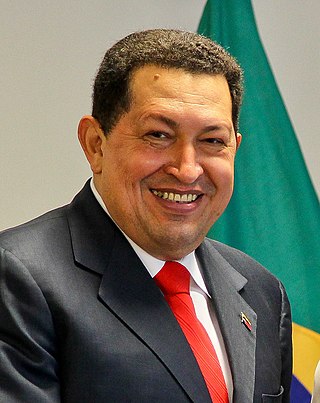
Hugo Rafael Chávez Frías was a Venezuelan politician and military officer who served as president of Venezuela from 1999 until his death in 2013, except for a brief period of forty-seven hours in 2002. Chávez was also leader of the Fifth Republic Movement political party from its foundation in 1997 until 2007, when it merged with several other parties to form the United Socialist Party of Venezuela (PSUV), which he led until 2012.

Telesur is a Latin American terrestrial and satellite news television network headquartered in Caracas, Venezuela and sponsored by the governments of Venezuela, Cuba and Nicaragua.

José Manuel Zelaya Rosales is a Honduran politician who was President of Honduras from 27 January 2006 until his forcible removal in the 2009 coup d'état, and who since January 2022 serves as the first First Gentleman of Honduras. He is the eldest son of a wealthy businessman, and inherited his father's nickname "Mel". Before entering politics he was involved in his family's logging and timber businesses.
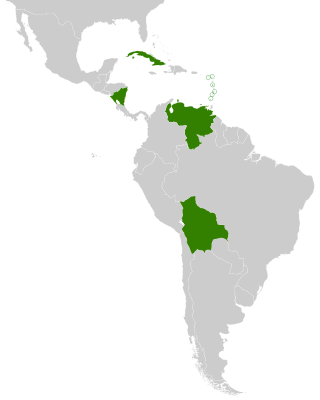
ALBA or ALBA–TCP, formally the Bolivarian Alliance for the Peoples of Our America or the Bolivarian Alliance for the Peoples of Our America – Peoples' Trade Treaty, is an intergovernmental organization based on the idea of political and economic integration of Latin American and Caribbean countries.

Osman Danilo Chávez Güity is a former Honduran footballer who played as a center back for last time in Honduran club CD Vida.

Marvin Antonio Chávez is a Honduran former footballer who played as a midfielder.
Carlos Salgado was a Honduran radio journalist and comedian. Salgado hosted a satirical radio show called Bean the Terrible and focused on social commentary and the satirising of well-known public figures in Honduras. His career as a popular radio journalist and commentator lasted more than 40 years.
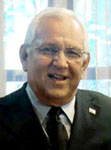
Roberto Micheletti Baín is a Honduran politician who served as the interim president of Honduras from 28 June 2009 to 27 January 2010 as a result of the 2009 Honduran coup d'état. The Honduran military ousted the President, and the National Congress read a letter of resignation, which was refuted two minutes later by Manuel Zelaya in conversation with CNN en Español; days later, the coup-plotters claimed that the Supreme Court had ordered to forcefully detain President Manuel Zelaya because "he was violating the Honduran constitution"; Zelaya was exiled rather than arrested. Micheletti, constitutionally next in line for the presidency, was sworn in as president by the National Congress a few hours after Zelaya was sent into exile by the Honduran military. He was not acknowledged as de jure president by any government or international organization. The 2009 general election took place as planned in November and elected Porfirio Lobo Sosa to succeed Micheletti.
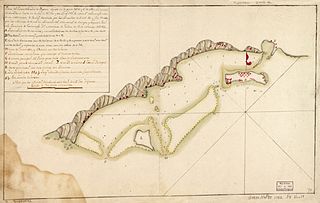
The Battle of Roatán was an American War of Independence battle fought on March 16, 1782, between British and Spanish forces for control of Roatán, an island off the Caribbean coast of present-day Honduras.

The 2009 Honduran constitutional crisis was a political dispute over plans to either rewrite the Constitution of Honduras or write a new one.

The 2009 Honduran coup d'état, which took place during the 2009 Honduran constitutional crisis, occurred when the Honduran Army, following orders from the Honduran Supreme Court, ousted President Manuel Zelaya on 28 June 2009 and sent him into exile. Zelaya had attempted to schedule a non-binding poll to hold a referendum on convening a constituent assembly for writing a new constitution. Despite court orders to cease, Zelaya refused to comply, and the Honduran Supreme Court issued a secret arrest warrant dated 26 June. Two days later, Honduran soldiers stormed the president's house in the middle of the night, detained him, and thwarted the poll. Instead of putting him on trial, the army put him on a military plane and flew him to Costa Rica. Later that day, after reading a resignation letter of disputed authenticity, the Honduran Congress voted to remove Zelaya from office and appointed Head of Congress Roberto Micheletti, his constitutional successor, to complete his term. This was the first coup to occur in the country since 1978.
The National Popular Resistance Front or National People's Resistance Front, frequently referred to as the National Resistance Front, is a wide coalition of Honduran grassroots organisations and political parties and movements that aims to restore elected President Manuel Zelaya and hold a constituent assembly to draw up a new constitution.
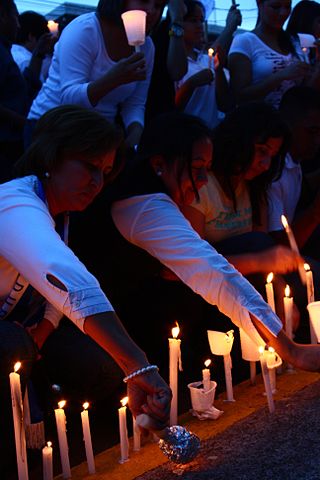
Unión Cívica Democrática is a network of forty Honduran activist organizations, which took an active part during the 2009 Honduran constitutional crisis, promoting several demonstrations against the former ousted president Manuel Zelaya.
David Meza Montesinos was a Honduran radio journalist. He reported for the El Patio radio station for more than 30 years before his murder in 2010. Meza was also a general assignment correspondent for the Radio America national broadcaster.
Jorge Alberto "Georgino" Orellana was a Honduran journalist, television producer and presenter for Televisión de Honduras, a private television station. Orellana was shot and killed on April 20, 2010, becoming the sixth Honduran journalist to be killed in the country since March 1, 2010.
Alejandro Peña Esclusa is a Venezuelan writer, analyst and political consultant, expert on the subject of the Sao Paulo Forum, about which he has written five books. The most sold of them is entitled "The Cultural War of the Sao Paulo Forum", which has been translated from Spanish into English, Portuguese, Italian, Slovenian and Hungarian.
Luis Ernesto Mendoza Cerrato was the owner of the Channel 24 broadcast facilities in Danli, Honduras. Mendoza was murdered outside the TV station and became one of 13 Honduran media workers and journalists to be murdered in a years time, only two of which were resolved. He was considered a prominent business person in Danli.
References
- ↑ O'Connor, Anne-Marie (2010-04-24). "Seven Honduran broadcasters slain since March 1". Washington Post . Retrieved 2010-05-10.